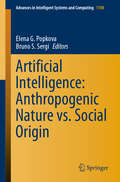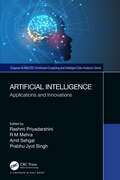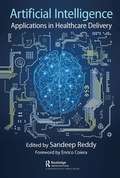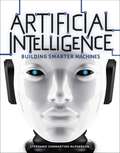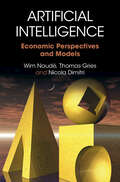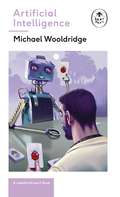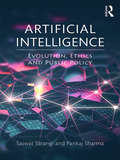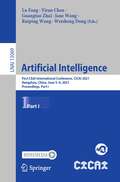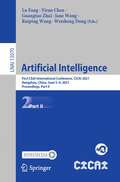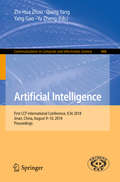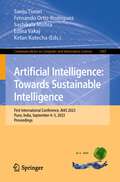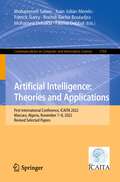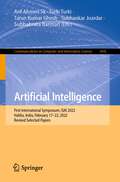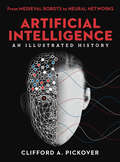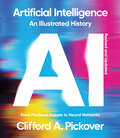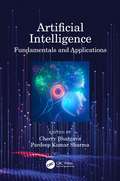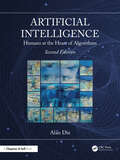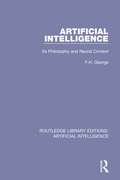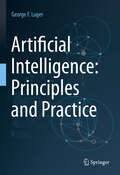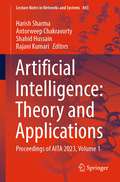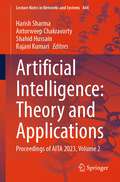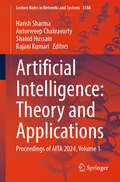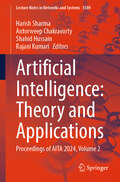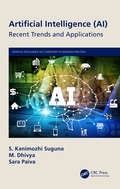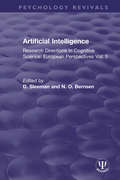- Table View
- List View
Artificial Intelligence: Anthropogenic Nature vs. Social Origin (Advances in Intelligent Systems and Computing #1100)
by Elena G. Popkova Bruno S. SergiThis book presents advanced research studies on the topic of artificial intelligence as a component of social and economic relations and processes. It gathers research papers from the International Research-to-Practice Conference “The 21st Century from the Positions of Modern Science: Intellectual, Digital and Innovative Aspects” (May 23–24, 2019, Nizhny Novgorod, Russia) and the International Research-to-Practice Conference “Economics of Pleasure: a Science of Enjoying Economic Activities” (October 3–5, 2019, Prague, Czech Republic). Both conferences were organized by the Autonomous Non-Profit Organization “Institute of Scientific Communications” (Volgograd). What sets this book apart from other publications on the topic of artificial intelligence is that it approaches AI not as a technological tool, but as an economic entity. Bringing together papers by representatives of various fields of social and human knowledge, it systematically reflects on various economic, social, and legal aspects of the creation, application, and development of artificial intelligence. Given the multidisciplinary nature of its content, the book will appeal to a broad target audience, including those engaged in developing AI (scientific research institutes and universities), and Industry 4.0 enterprises interested in its implementation, as well as state regulators for the digital economy.
Artificial Intelligence: Applications and Innovations (Chapman & Hall/Distributed Computing and Intelligent Data Analytics Series)
by Rashmi Priyadarshini, R M Mehra, Amit Sehgal and Prabhu Jyot SinghArtificial Intelligence: Applications and Innovations is a book about the science of artificial intelligence (AI). AI is the study of the design of intelligent computational agents. This book provides a valuable resource for researchers, scientists, professionals, academicians and students dealing with the new challenges and advances in the areas of AI and innovations. This book also covers a wide range of applications of machine learning such as fire detection, structural health and pollution monitoring and control. Key Features Provides insight into prospective research and application areas related to industry and technology Discusses industry- based inputs on success stories of technology adoption Discusses technology applications from a research perspective in the field of AI Provides a hands- on approach and case studies for readers of the book to practice and assimilate learning This book is primarily aimed at graduates and post- graduates in computer science, information technology, civil engineering, electronics and electrical engineering and management.
Artificial Intelligence: Applications in Healthcare Delivery
by Sandeep ReddyThe rediscovery of the potential of artificial intelligence (AI) to improve healthcare delivery and patient outcomes has led to an increasing application of AI techniques such as deep learning, computer vision, natural language processing, and robotics in the healthcare domain. Many governments and health authorities have prioritized the application of AI in the delivery of healthcare. Also, technological giants and leading universities have established teams dedicated to the application of AI in medicine. These trends will mean an expanded role for AI in the provision of healthcare. Yet, there is an incomplete understanding of what AI is and its potential for use in healthcare. This book discusses the different types of AI applicable to healthcare and their application in medicine, population health, genomics, healthcare administration, and delivery. Readers, especially healthcare professionals and managers, will find the book useful to understand the different types of AI and how they are relevant to healthcare delivery. The book provides examples of AI being applied in medicine, population health, genomics, healthcare administration, and delivery and how they can commence applying AI in their health services. Researchers and technology professionals will also find the book useful to note current trends in the application of AI in healthcare and initiate their own projects to enable the application of AI in healthcare/medical domains.
Artificial Intelligence: Building Smarter Machines
by Stephanie Sammartino McPhersonIn 2011 a computer named Watson outscored two human competitors on the TV quiz show Jeopardy! and snagged the million-dollar prize. Watson isn't the only machine keeping up with humans. The field of artificial intelligence (AI) is booming, with drones, robots, and computers handling tasks that once only humans could perform. Such advances raise challenging questions. Do Watson and other computers really think? Can machines acquire self-awareness? Is AI a promising or a dangerous technology? No machine, not even Watson, yet comes close to matching human intelligence, but many scientists believe it is only a matter of time before we reach this milestone. What will such a future look like?
Artificial Intelligence: Economic Perspectives and Models
by Wim Naudé Thomas Gries and Nicola DimitriIs Artificial Intelligence a more significant invention than electricity? Will it result in explosive economic growth and unimaginable wealth for all, or will it cause the extinction of all humans? Artificial Intelligence: Economic Perspectives and Models provides a sober analysis of these questions from an economics perspective. It argues that to better understand the impact of AI on economic outcomes, we must fundamentally change the way we think about AI in relation to models of economic growth. It describes the progress that has been made so far and offers two ways in which current modelling can be improved: firstly, to incorporate the nature of AI as providing abilities that complement and/or substitute for labor, and secondly, to consider demand-side constraints. Outlining the decision-theory basis of both AI and economics, this book shows how this, and the incorporation of AI into economic models, can provide useful tools for safe, human-centered AI.
Artificial Intelligence: Everything you need to know about the coming AI. A Ladybird Expert Book (The Ladybird Expert Series #27)
by Michael Wooldridge'I propose to consider the question, 'Can machines think?' Alan Turing (1950)Part of the ALL-NEW Ladybird Expert series.This book is for everyone living in the age of Artificial Intelligence. And this is an accessible and authoritative introduction to one of the most important conversations of our time . . . Written by computer scientist Michael Wooldridge, Artificial Intelligence chronicles the development of intelligent machines, from Turing's dream of machines that think, to today's digital assistants like Siri and Alexa. AI is not something that awaits us in the future. Inside you'll learn how we have come to rely on embedded AI software and what a world of ubiquitous AI might look like.What's inside?- The British mathematician Alan Turing- Can machines 'understand'?- Logical and Behavioural AI- The reality of AI today- AI tomorrow- And much more . . . For an adult readership, the Ladybird Expert series is produced in the same iconic small hardback format pioneered by the original Ladybirds. Each beautifully illustrated book features the first new illustrations produced in the original Ladybird style for nearly forty years.
Artificial Intelligence: Evolution, Ethics and Public Policy
by Pankaj Sharma Saswat SarangiWhat will the future be? A dystopian landscape controlled by machines or a brave new world full of possibilities? Perhaps the answer lies with Artificial Intelligence (AI)—a phenomenon much beyond technology that has, continues to, and will shape lives in ways we do not understand yet. This book traces the evolution of AI in contemporary history. It analyses how AI is primarily being driven by "capital" as the only "factor of production" and its consequences for the global political economy. It further explores the dystopian prospect of mass unemployment by AI and takes up the ethical aspects of AI and its possible use in undermining natural and fundamental rights. A tract for the times, this volume will be a major intervention in an area that is heavily debated but rarely understood. It will be essential reading for researchers and students of digital humanities, politics, economics, science and technology studies, physics, and computer science. It will also be key reading for policy makers, cyber experts and bureaucrats.
Artificial Intelligence: First CAAI International Conference, CICAI 2021, Hangzhou, China, June 5–6, 2021, Proceedings, Part I (Lecture Notes in Computer Science #13069)
by Guangtao Zhai Jane Wang Yiran Chen Lu Fang Ruiping Wang Weisheng DongThis two-volume set LNCS 13069-13070 constitutes selected papers presented at the First CAAI International Conference on Artificial Intelligence, held in Hangzhou, China, in June 2021. Due to the COVID-19 pandemic the conference was partially held online. The 105 papers were thoroughly reviewed and selected from 307 qualified submissions. The papers are organized in topical sections on applications of AI; computer vision; data mining; explainability, understandability, and verifiability of AI; machine learning; natural language processing; robotics; and other AI related topics.
Artificial Intelligence: First CAAI International Conference, CICAI 2021, Hangzhou, China, June 5–6, 2021, Proceedings, Part II (Lecture Notes in Computer Science #13070)
by Guangtao Zhai Jane Wang Yiran Chen Lu Fang Ruiping Wang Weisheng DongThis two-volume set LNCS 13069-13070 constitutes selected papers presented at the First CAAI International Conference on Artificial Intelligence, held in Hangzhou, China, in June 2021. Due to the COVID-19 pandemic the conference was partially held online. The 105 papers were thoroughly reviewed and selected from 307 qualified submissions. The papers are organized in topical sections on applications of AI; computer vision; data mining; explainability, understandability, and verifiability of AI; machine learning; natural language processing; robotics; and other AI related topics.
Artificial Intelligence: First CCF International Conference, ICAI 2018, Jinan, China, August 9-10, 2018, Proceedings (Communications in Computer and Information Science #888)
by Yu Zheng Yang Gao Zhi-Hua Zhou Qiang YangThis book constitutes the refereed proceedings of the First CCF International Conference on Artificial Intelligence, CCF-ICAI 2018, held in Jinan, China in August, 2018. The 17 papers presented were carefully reviewed and selected from 82 submissions. The papers are organized in topical sections on unsupervised learning, graph-based and semi-supervised learning, neural networks and deep learning, planning and optimization, AI applications.
Artificial Intelligence: First International Conference, AI4S 2023, Pune, India, September 4-5, 2023, Proceedings (Communications in Computer and Information Science #1907)
by Ketan Kotecha Sanju Tiwari Fernando Ortiz-Rodríguez Sashikala Mishra Edlira VakajThis book constitutes the proceedings of the First International Conference, AI4S 2023, held in Pune, India, during September 4-5, 2023.The 14 full papers and the 2 short papers included in this volume were carefully reviewed and selected from 72 submissions. This volume aims to open discussion on trustworthy AI and related topics, trying to bring the most up to date developments around the world from researchers and practitioners.
Artificial Intelligence: First International Conference, ICAITA 2022, Mascara, Algeria, November 7–8, 2022, Revised Selected Papers (Communications in Computer and Information Science #1769)
by Patrick Siarry Juan Julián Merelo Mohammed Salem Rochdi Bachir Bouiadjra Mohamed Debakla Fatima DebbatThis volume constitutes selected papers presented at the First International Conference on Artificial Intelligence: Theories and Applications, ICAITA 2022, held in Mascara, Algeria, in November 2022. The 23 papers were thoroughly reviewed and selected from the 66 qualified submissions. They are organized in topical sections on artificial vision; and articial intelligence in big data and natural language processing.
Artificial Intelligence: First International Symposium, ISAI 2022, Haldia, India, February 17-22, 2022, Revised Selected Papers (Communications in Computer and Information Science #1695)
by Arif Ahmed Sk Turki Turki Tarun Kumar Ghosh Subhankar Joardar Subhabrata BarmanThis book constitutes the refereed proceedings of the First International Symposium on Artificial Intelligence, ISAI 2022, held in Haldia, India, during February 17-22, 2022. The 30 full papers included in this book were carefully reviewed and selected from 75 submissions. They were organized in topical sections as follows: information systems, mathematics and data analyses; and applied artificial intelligence..
Artificial Intelligence: From Medieval Robots to Neural Networks (Union Square & Co. Illustrated Histories)
by Clifford A. Pickover“This is an addictive stroll through the annals of artificial intelligence, highlighting almost 100 innovations developed between 1300 BCE and 2018” (Booklist).From medieval robots and Boolean algebra to facial recognition, artificial neural networks, and adversarial patches, this fascinating history takes readers on a lively tour through the world of artificial intelligence. Award–winning author Clifford A. Pickover (The Math Book, The Physics Book, Death & the Afterlife) explores the historic and current applications of AI in such diverse fields as computing, medicine, popular culture, mythology, and philosophy, and considers the enduring threat to humanity should AI grow out of control. Across 100 illustrated entries, Pickover provides an entertaining and informative look into when artificial intelligence began, how it developed, where it’s going, and what it means for the future of human-machine interaction.“An enjoyable diversion to read cover to cover, follow along common strands, or dip into for random bits.” —Booklist
Artificial Intelligence: From Medieval Robots to Neural Networks (Union Square & Co. Illustrated Histories)
by Clifford A. PickoverA History of the Future that's Happening Right NowArtificial Intelligence: An Illustrated History explores the historic origins and current applications of AI in such diverse fields as computing, medicine, popular culture, mythology, and philosophy. Through more than 100 entries, award-winning author Clifford A. Pickover, offers a granular, yet accessible, glimpse into the world of AI—from medieval robots and Boolean algebra to facial recognition, and artificial neural networks. First released in 2019, this updated paperback edition brings readers up to speed with coverage of technologies such as DALL-E and ChatGPT, and it explores the very real fear that AI will alter the course of humanity—forever.
Artificial Intelligence: Fundamentals and Applications
by Cherry Bhargava Pradeep Kumar SharmaThis comprehensive reference text discusses the fundamental concepts of artificial intelligence and its applications in a single volume. Artificial Intelligence: Fundamentals and Applications presents a detailed discussion of basic aspects and ethics in the field of artificial intelligence and its applications in areas, including electronic devices and systems, consumer electronics, automobile engineering, manufacturing, robotics and automation, agriculture, banking, and predictive analysis. Aimed at senior undergraduate and graduate students in the field of electrical engineering, electronics engineering, manufacturing engineering, pharmacy, and healthcare, this text: Discusses advances in artificial intelligence and its applications. Presents the predictive analysis and data analysis using artificial intelligence. Covers the algorithms and pseudo-codes for different domains. Discusses the latest development of artificial intelligence in the field of practical speech recognition, machine translation, autonomous vehicles, and household robotics. Covers the applications of artificial intelligence in fields, including pharmacy and healthcare, electronic devices and systems, manufacturing, consumer electronics, and robotics.
Artificial Intelligence: Humans at the Heart of Algorithms
by Alan DixAn authoritative and accessible one-stop resource, the first edition of An Introduction to Artificial Intelligence presented one of the first comprehensive examinations of AI. Designed to provide an understanding of the foundations of artificial intelligence, it examined the central computational techniques employed by AI, including knowledge representation, search, reasoning and learning, as well as the principal application domains of expert systems, natural language, vision, robotics, software agents and cognitive modelling. Many of the major philosophical and ethical issues of AI were also introduced. This new edition expands and revises the book throughout, with new material to augment existing chapters, including short case studies, as well as adding new chapters on explainable AI, big data and deep learning, temporal and web-scale data, statistical methods and data wrangling. It expands the book’s focus on human-centred AI, covering gender, ethnic and social bias, the need for transparency, intelligent user interfaces, and designing interactions to aid machine learning. With detailed, well-illustrated examples and exercises throughout, this book provides a substantial and robust introduction to artificial intelligence in a clear and concise coursebook form. It stands as a core text for all students and computer scientists approaching AI.You can also visit the author website for further resources: https://alandix.com/aibook/.
Artificial Intelligence: Its Philosophy and Neural Context (Routledge Library Editions: Artificial Intelligence)
by F. H. GeorgeOriginally published in 1986, in order to probe, dispute and analyse the role of artificial intelligence in cybernetic thought and information science, the author pursues this topic within its philosophical, behavioral and neurophysiological contexts, while drawing attention to cognitive issues. By elucidating the problems and potential associated with knowledge-based systems, the book emphasized the need to examine artificial intelligence in its own right.
Artificial Intelligence: Principles and Practice
by George F. LugerThis book provides a complete introduction to Artificial Intelligence, covering foundational computational technologies, mathematical principles, philosophical considerations, and engineering disciplines essential for understanding AI. Artificial Intelligence: Principles and Practice emphasizes the interdisciplinary nature of AI, integrating insights from psychology, mathematics, neuroscience, and more. The book addresses limitations, ethical issues, and the future promise of AI, emphasizing the importance of ethical considerations in integrating AI into modern society. With a modular design, it offers flexibility for instructors and students to focus on specific components of AI, while also providing a holistic view of the field. Taking a comprehensive but concise perspective on the major elements of the field; from historical background to design practices, ethical issues and more, Artificial Intelligence: Principles and Practice provides the foundations needed for undergraduate or graduate-level courses. The important design paradigms and approaches to AI are explained in a clear, easy-to-understand manner so that readers will be able to master the algorithms, processes, and methods described. The principal intellectual and ethical foundations for creating artificially intelligent artifacts are presented in Parts I and VIII. Part I offers the philosophical, mathematical, and engineering basis for our current AI practice. Part VIII presents ethical concerns for the development and use of AI. Part VIII also discusses fundamental limiting factors in the development of AI technology as well as hints at AI's promising future. We recommended that PART I be used to introduce the AI discipline and that Part VIII be discussed after the AI practice materials. Parts II through VII present the three main paradigms of current AI practice: the symbol-based, the neural network or connectionist, and the probabilistic. Generous use of examples throughout helps illustrate the concepts, and separate end-of-chapter exercises are included. Teaching resources include a solutions manual for the exercises, PowerPoint presentation, and implementations for the algorithms in the book.
Artificial Intelligence: Proceedings of AITA 2023, Volume 1 (Lecture Notes in Networks and Systems #843)
by Shahid Hussain Harish Sharma Antorweep Chakravorty Rajani KumariThis book features a collection of high-quality research papers presented at International Conference on Artificial Intelligence: Theory and Applications (AITA 2023), held during 11–12 August 2023 in Bengaluru, India. The book is divided into two volumes and presents original research and review papers related to artificial intelligence and its applications in various domains including health care, finance, transportation, education, and many more.
Artificial Intelligence: Proceedings of AITA 2023, Volume 2 (Lecture Notes in Networks and Systems #844)
by Shahid Hussain Harish Sharma Antorweep Chakravorty Rajani KumariThis book features a collection of high-quality research papers presented at International Conference on Artificial Intelligence: Theory and Applications (AITA 2023), held during 11–12 August 2023 in Bengaluru, India. The book is divided into two volumes and presents original research and review papers related to artificial intelligence and its applications in various domains including health care, finance, transportation, education, and many more.
Artificial Intelligence: Proceedings of AITA 2024, Volume 1 (Lecture Notes in Networks and Systems #5588)
by Shahid Hussain Harish Sharma Antorweep Chakravorty Rajani KumariThis book features a collection of high-quality research papers presented at International Conference on Artificial Intelligence: Theory and Applications (AITA 2024), held during 9–10 August 2024 in Bengaluru, India. The book is divided into two volumes and presents original research and review papers related to artificial intelligence and its applications in various domains including health care, finance, transportation, education, and many more.
Artificial Intelligence: Proceedings of AITA 2024, Volume 2 (Lecture Notes in Networks and Systems #5589)
by Shahid Hussain Harish Sharma Antorweep Chakravorty Rajani KumariThis book features a collection of high-quality research papers presented at International Conference on Artificial Intelligence: Theory and Applications (AITA 2024), held during 9–10 August 2024 in Bengaluru, India. The book is divided into two volumes and presents original research and review papers related to artificial intelligence and its applications in various domains including health care, finance, transportation, education, and many more.
Artificial Intelligence: Recent Trends and Applications (Artificial Intelligence (AI): Elementary to Advanced Practices)
by S. Kanimozhi Suguna, M. Dhivya, and Sara PaivaThis book aims to bring together leading academic scientists, researchers, and research scholars to exchange and share their experiences and research results on all aspects of Artificial Intelligence. The book provides a premier interdisciplinary platform to present practical challenges and adopted solutions. The book addresses the complete functional framework workflow in Artificial Intelligence technology. It explores the basic and high-level concepts and can serve as a manual for the industry for beginners and the more advanced. It covers intelligent and automated systems and its implications to the real-world, and offers data acquisition and case studies related to data-intensive technologies in AI-based applications. The book will be of interest to researchers, professionals, scientists, professors, students of computer science engineering, electronics and communications, as well as information technology.
Artificial Intelligence: Research Directions in Cognitive Science: European Perspectives Vol. 5 (Psychology Revivals)
by D. Sleeman N. O. BernsenOriginally published in 1992, this title reviews seven major subareas in artificial intelligence at that time: knowledge acquisition; logic programming and representation; machine learning; natural language; vision; the design of an AI programming environment; and medicine, a major application area of AI. This volume was an attempt primarily to inform fellow AI workers of recent European work in AI. It was hoped that researchers in ‘sister’ disciplines, such as computer science and linguistics would gain a deeper understanding of the assumptions, techniques and tools of contemporary AI.
